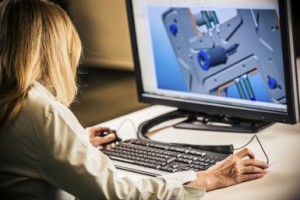 There are many uniquely exciting careers in human factors psychology for students who are mutually interested in engineering and psychology.
There are many uniquely exciting careers in human factors psychology for students who are mutually interested in engineering and psychology.
What is Human Factors Psychology?
Human factors psychology is a multi-disciplinary field that researches and discovers information about observed behaviors, psychological processes and cognitive limitations. This clinical data is applied to the design and evaluation of job processes, consumer products, technology systems and work environments in order to enhance safety, quality and productivity. Human factors psychologists apply their in-depth knowledge of memory, perceptual and cognitive processes to improve employee and system performance levels. Their ultimate goal is to establish a more effective human-machine interface and workflow.
Human Factors Psychology and Engineering
According to the American Psychological Association (APA), engineering psychology is a common career for students interested in science-based engineering and human factors psychology. The APA notes that there are many career paths with engineering psychology. For example, some students choose to study the complex relationships between workers, machines and technology. These engineering psychologists study human behaviors and biological abilities, such as visual cognition, attention span and decision-making, in order to make systems and machines more functional and efficient.
Human Factors Psychology and Consumer Products
On the other hand, other human factors psychologists focus on consumer research, products and manufacturing. These professionals frequently cooperate and communicate with engineers, technicians and manufacturers in order to make products more accessible and user-friendly. For example, a human factors psychologist may work with a large technology company to re-design a poor selling smart phone in order to make it more functional and appealing to consumers.
Human Factors Psychology and Consumer Products
There are other careers available for human factors psychologists who are more interested in studying the integrated relationship between workers, equipment and their environments. These professionals work with engineers to design equipment and workplace systems that enhance safety and productivity. For example, these human factors psychologists may conduct comprehensive research into designing high performance health care equipment that minimizes operator mistakes and operational errors.
What Human Factors Psychologists Do
Human factors psychologists conduct copious amounts of controlled experiments that result in quantitative data and research. For example, they may provide control groups each with a modified tool to use or work process to complete. They will monitor and analyze how the users reach the experiment’s objectives. On the other hand, human factors psychologists may delve into cognitive and neuropsychological research on how people misread information displays in order to reduce human errors. Sometimes, large companies will call in consulting human factors psychologists to work on specific projects. For example, an industrial company may want to understand and eliminate repeat incidents caused by human mistakes that cause damages, accidents and injuries.
A Typical Job Ad for a Human Factors Psychologists
The human factors engineer will collaborate with external clients and internal business units to contribute to the design and development of better products. They will help achieve strategic production and customer goals through innovative research, creative industrial design and user interaction analysis. The human factors engineer will conduct ergonomic evaluations of product prototypes and associated interactive usability tests. Afterwards, they will prepare reports and presentations for clients, management and executives that concisely communicate research results and recommendations. They must have an accredited master’s degree related to human factors, such as ergonomics, engineering or cognitive psychology.
Related Resource: Behavioral Psychology
To finish, human factors psychologists improve work equipment, processes and environments in order to improve safety, efficiency and productivity. Keep in mind that there are many more exciting careers in human factors psychology available for students.
 Follow
Follow